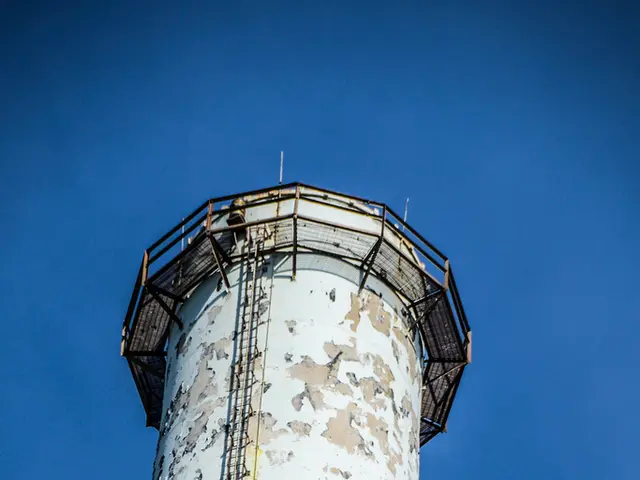Conflict in Gaza: Understanding Egypt's Apprehension over Israel's Rafah Offensive and Its Potential Impacts on Their Peace Agreement
Havoc brews as Israel prepares for Gaza ground offensive
As Israel gears up for a full-scale attack on the Gaza Strip's Rafah, southern Egypt braces for potential chaos. The town, now home to over a million displaced Palestinians, is being pummeled by Israeli airstrikes, threatening a humanitarian catastrophe and the existing peace treaty between Israel and Egypt.
Before the recent onslaught, Rafah housed approximately 250,000 residents. Now, surrounded by makeshift tents, the population density has swelled to 1.4 million people, crammed into just 62 square kilometers. Aid workers warn that an Israeli ground operation in this densely populated area would have disastrous consequences for both the local population and healthcare services.
Egypt faces the uneasy prospect of having Israeli troops along its border with Gaza, which, according to anonymous sources, could derail the peace treaty. However, Foreign Minister Sameh Shoukri has swiftly dismissed these concerns. Israel's incursion into Rafah would mark a significant shift in the town's fortunes, as it was previously regarded as a "safe zone" for those fleeing the Israeli assault on Gaza.
The division of Rafah dates back to the 1979 peace treaty between Israel and Egypt. Following the Israeli retreat from occupied territories, the town was split into an Egyptian and a Palestinian side. The treaty stipulated four demilitarized zones: two located in Sinai and Israel, designated as Zones A and B, and the Palestinian side of Rafah, known as Zone D, as a demilitarized buffer zone of 3 kilometers along the border. Zone C, the Egyptian side of Rafah, would be protected by a civilian police force and UN peacekeepers, armed with only light weapons [6].
Yet, the ongoing insurgency in Sinai has led Israel to seek exceptions to the demilitarization of Zone C over the past decade. With Egyptian President Abdel Fattah el-Sisi's backing, Egyptian troops have taken control of the area.
The Philadelphi Corridor, a 14-kilometer long and 100-meter wide strip along the border between Gaza and Egypt, serves as a demilitarized buffer zone. Israel seized control of this corridor as part of the 1979 peace treaty and later handed it over to the Palestinian Authority following the 2005 Philadelphi Accord. Recently, Israeli Prime Minister Benjamin Netanyahu declared the need for Israeli forces to regain control of the corridor. In response, Egyptian officials said that such a move would violate the peace treaty.
Tensions could escalate further if Israel attempts to reoccupy the Philadelphi Corridor without Egypt's consent, posing a threat to both the Philadelphi Accord and the peace treaty. In such a scenario, Egypt would have the right to deploy its own border guards to counterterrorism and non-military purposes in the corridor, according to the Philadelphi Accord. Israel, meanwhile, would be limited to deploying a force of four infantry battalions, with restricted access to heavy weaponry, under the 1979 peace treaty. Any deviations from these terms would require mutual agreement between Egypt and Israel, as stipulated in the treaty [6].
International lawyer Djaouida Siaci argued that Israel's occupation of the Philadelphi corridor and the deployment of heavy weaponry would amount to a "blatant violation" of the peace treaty. Similarly, Middle East expert Mohannad Sabry asserted that Israel's actions would constitute a "full breach" of the treaty's security provisions.
Despite the heated rhetoric, Sabry suggested that Egypt and Israel are likely to navigate the situation diplomatically, coupled with behind-the-scenes discussions to ensure the peace treaty remains intact.
Egyptian authorities are reportedly taking measures to prepare for a potential influx of Palestinian refugees from Gaza. Allegedly, a 10-kilometer buffer zone is being constructed under the watchful eye of the Armed Forces Engineering Authority [1]. However, a military source insists that Egypt has no intention of accepting a mass influx of Palestinians, claiming the construction "aims to create a centralized area to limit infiltration of militants into Sinai and to prepare for the worst" [1].
It's worth noting that Egypt has faced similar challenges in the past. In January 2008, Gaza was experiencing a humanitarian crisis, exacerbated by border closures from both Israel and Egypt. In response, Palestinians breached the border and flooded into Egypt in search of food and essential supplies. Hosni Mubarak, the Egyptian president at the time, instructed the military not to attack the Palestinians.
As the situation in Gaza intensifies, it remains to be seen whether Egypt will once again open its borders to those seeking refuge. One military source hinted that Egypt will provide humanitarian assistance to the displaced Palestinians while implementing strict measures to screen their identification documents [1]. However, should Israel push ahead with its planned offensive in Rafah, the consequences for Egyptian-Israeli relations are far from certain.
- Note:
- Sensor Tower on Medium
- Middle East Eye
- Al Jazeera
- The Wall Street Journal
- Middle East Monitor
- Brookings Institution
- Selected Enrichment Data: The Philadelphi Accord (2005) and the Camp David Accords (1979) are treaties that dictate the relationships between Egypt, Israel, and the Gaza Strip. Violating these treaties by deploying troops in the Philadelphi Corridor or occupying it would result in various diplomatic and strategic consequences, possibly leading to a suspension of the peace treaty. Egypt could deploy border guards in the corridor under the Philadelphi Accord, while Israel would be limited to a smaller military presence under the Camp David Accords. Breaking these terms would require mutual agreement between Egypt and Israel, as stipulated in the treaties.
- The media's analysis of the situation in the Middle East indicates a possible humanitarian crisis in Rafah, Egypt, due to Israel's airstrikes in the area, which is now home to over a million Palestinian refugees.
- The prospect of an Israeli ground operation in the densely populated Rafah could have disastrous consequences for local residents and healthcare services, according to aid workers.
- Diplomatic conflicts could arise between Egypt and Israel if Israel reoccupies the Philadelphi Corridor, a previous buffer zone between Gaza and Egypt, without Egypt's consent.
- Egypt's Foreign Minister, Sameh Shoukri, has dismissed concerns that Israeli troops along the border with Gaza could derail the peace treaty between Israel and Egypt.
- In the event of a mass influx of Palestinians from Gaza, Egypt is reportedly constructing a 10-kilometer buffer zone to limit infiltration of militants into Sinai, according to a military source.
- The ongoing insurgency in Sinai has led Israel to seek exceptions to the demilitarization of Zone C (Egypt's side of Rafah) over the past decade, with the support of Egyptian President Abdel Fattah el-Sisi.







